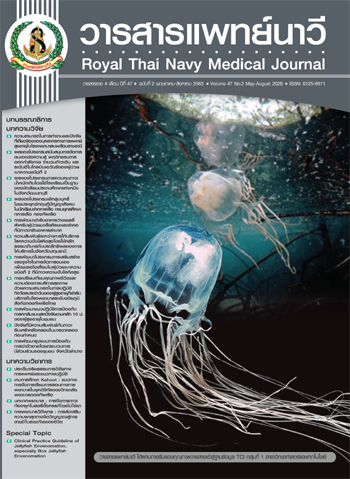The Effects of the Smoking Cessation Program applying the Social Cognitive Theory among Naval Rating Students at Naval Education Department, Royal Thai Navy
Main Article Content
Abstract
The purpose of this quasi-experimental research was to examine the effects of smoking cessation program to quit smoking applying the Social Cognitive Theory. The sample were 68 Naval Rating students who were currently smokers from Naval Education Department, Royal Thai Navy. They were divided into the experimental and the control groups of 34 students each and these students intended to quit smoking at the stage of preparation. The program was conducted over a period of 8 weeks. The experimental group received the smoking cessation program applying the Social Cognitive Theory. The program consisted of activities for creating smoke-free zone environments, knowledge and skills training to quit smoking, building their self-efficacy, and outcome expectation of quitting smoking. The control group received knowledge about the harmful effects of smoking and smoking cessation. Data collection was done at pre and post intervention stage on the 4th and 8th week by self-administered questionnaire. Statistical analysis was performed by using descriptive statistics and inferential statistics including Chi-square test, Independent t-test, Z-test and Repeated measures ANOVA.
The results revealed that, after the smoking cessation program at the 4th and 8th week, the experimental group had significantly increased their knowledge of quitting smoking, perception on self-efficacy, outcome expectation to quit smoking, and able to quit smoking continuously for more than 7 days higher than at the pre-intervention phase than the comparison group (p < .001). Besides, 21 in 34 smokers of experimental group were able to stop smoking at the 4th week, at 61.8%. Then, 7 smokers of this group were able to stop smoking at the 8th week. In total, 28 smokers successfully quitted smoking at 82.4%. When comparing the proportion of smoking cessation in both periods, the experimental group had a significantly higher smoking cessation rate than the control group (Z < .001). Therefore, the theoretical based smoking cessation program applying the Social Cognitive Theory could be applied to help stop smoking for Naval Rating students as well as other military academies.
Article Details

This work is licensed under a Creative Commons Attribution-NonCommercial-NoDerivatives 4.0 International License.
References
2. World Health Organization. Top 10 causes of death worldwide in 2018. [Internet]. [cited 2020 March 9]. Available from: https://www.who.int/news-room/fact-sheets/detail/the-top-10-causes-of-death
3. World Health Organization. Framework convention on tobacco control defines tobacco products as “products entirely or partly made of the leaf tobacco as raw material which are manufactured to be used for smoking, sucking, chewing or snuffing” in 2019. [Internet]. [cited 2020 March 9]. Available from: https://www.who.int/news-room/fact-sheets/detail/tobacco
4. Centers for Disease Control and Prevention. Cigarette smoking among adults and trends in smoking cessation - United States, 2008. MMWR Morb Mortal Wkly Rep 2009 Nov 13;58(44):1227-32.
5. U.S. Department of Health and Human Services. The health consequences of smoking-50 years of progress: a report of the surgeon general. Atlanta: Centers for Disease Control and Prevention, National Center for Chronic Disease Prevention and Health Promotion, Office on Smoking and Health; 2010.
6. World Health Organization. Stop tobacco industry interference on world no tobacco day 2012 [Internet]. [cited 2020 March 9]. Available from: http://www. who.int/mediacentre/news/releases/2012/tobacco_20120530/en
7. SMOKE FREE ZONE. Tobacco and youth (Data center). [Internet]. [cited 2020 March 9]. Available from: http:// www.ashthailand.or.th/en/youth.php (in Thai).
8. Preechawong S, Wongsaita N, Taweepatana H, Kaewkham S. A Review of studies related to smoking in high schools. Journal of Health Education 2014;37(128):15-28. (in Thai).
9. National Statistical Office. Executive summary: the smoking and drinking behavior survey 2017. Bangkok: Pimdeekarnpim; 2017. (in Thai).
10. Information section, Medical Information Division, Naval Medical Department. Annual health examination statistics of Navy personnel 2018. Bangkok: Naval Medical Department; 2018. (in Thai).
11. Chloseda A, Leerapan P, Kengganpanich M, Kengganpanich T. Smoking behavior responses to the tobacco consumption control policy of the Thai in Naval Rating school. Journal of Tobacco Control (Thailand) 2008;2(1):34-49. (in Thai).
12. Raya P, Benjakul S, Kengganpanich M, Kengganpanich T. Effects of a the smoking cessation program applying Transtheoretical model among smokers at Wanwon Sub-district, Kantang District, Trang Province. Journal of Boromarajonani College of Nursing, Bangkok 2015;31(2):9-25. (in Thai).
13. Pantaewan P, Prasittivatechakod A. Application of transtheoretical model and smoking behavior modification. Journal of The Royal Thai Army Nurses 2014;15(1):36-44. (in Thai).
14. Sawang W, Subwirapakon W. Self-management group counseling to reduce smoking behavior of Naval Rating student. Journal of Education and Social Development 2011;7(2):85-99. (in Thai).
15. Kleebpratoom P, Benjakul S, Kengganpanich M, Kengganpanich T. Efects of the smoking cessation program for quit smoking behavior among smokers at Bangkaew subdistrict, Mung Angthong. Veridian E-Journal Science and Technology Silpakorn University 2016;3(4):30-43. (in Thai).
16. Sangkaew P, Kengganpanich M, Kengganpanich T, Benjakul S, Neelapaichit N. An assessment of smoking behavior among workers in a public hospital in Bangkok Metropolitan. Journal of Health Education 2015;38(130):4-16. (in Thai).
17. Chaisalee W, Benjakul S, Kengganpanich M, Kengganpanich T. Effects of promoting smoking cessation program in drug dependence disorder patients at a hospital in Songkhla province. Journal of Public Health 2017;47(2):164-7. (in Thai).
18. Bandura A. Social cognitive theory. In: Vasta R, editor. Annals of child development. Vol.6. Six theories of child development Greenwich, CT: JAI Press; 1989. p. 1-60.
19. Naval Medical Department. Strategic plan 2016-2019, Naval Medical Department. [Internet]. [cited 2019 March 9]. Available from: https://www.nmd.go.th/ (in Thai).
20. Prochaska JO, Norcross JC, Diclemente CC. Changing for good : a revolutionary six-stage program for overcoming bad habits and moving your life positively forward. New York: Harper Collins Publishers; 2006.
21. Shein-Chung C, Jun S, Hansheng W. Sample size calculation in clinical research. 2nd ed. New York: Marcel Dekker Inc; 2008.
22. Chouinard M, Robichaud S. The effectiveness of a nursing inpatient smoking cessation program in individuals with cardiovascular disease. Nurs Res 2005;54(4):243-54.


